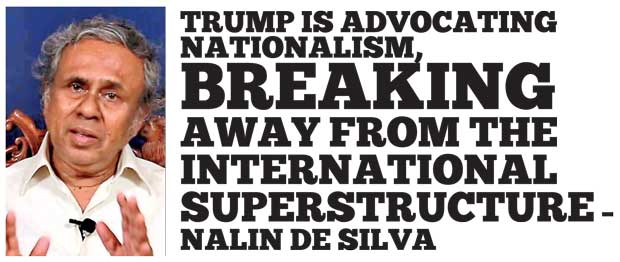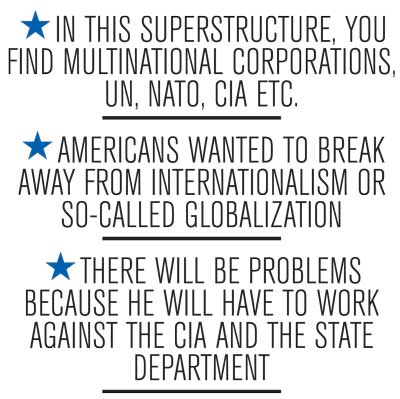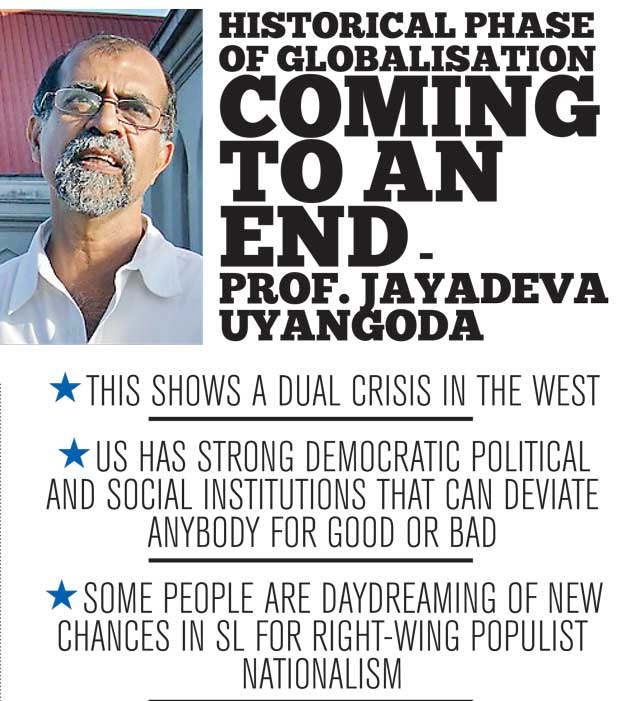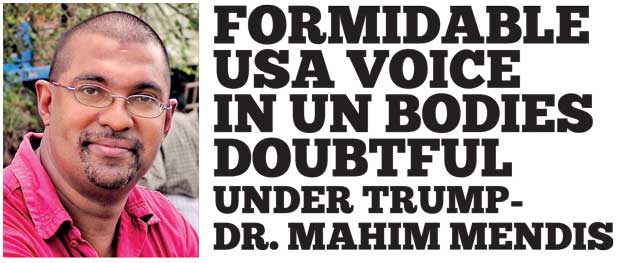Reply To:
Name - Reply Comment
Last Updated : 2024-04-24 22:26:00
 Donald Trump who challenged the US establishment and the existing global trends recorded a surprise win at the Presidential election over incumbent Secretary of State Hillary Clinton seen as the favourite of the establishment and the international media. Trump campaigned on a populist, nationalist ticket and was even spurned by the hierarchy of the Republican Party. His victory came in the
Donald Trump who challenged the US establishment and the existing global trends recorded a surprise win at the Presidential election over incumbent Secretary of State Hillary Clinton seen as the favourite of the establishment and the international media. Trump campaigned on a populist, nationalist ticket and was even spurned by the hierarchy of the Republican Party. His victory came in the

wake of Brexit in UK and rising nationalism in Europe. Trump was strongly backed by personalities holding anti-globalist and anti-internationalist ideology including Steve Bannon designated to be President Trump’s Chief strategist. Since being elected Trump has ruffled many feathers coming out strongly against the liberal international media, the CIA and NATO. As he takes oaths in office as the 45th President of the US on January 20; the Daily Mirror spoke to three Sri Lankan academics across the ideological divide on their views regarding the Trump phenomena and the future of international politics and organizations.


Professor of mathematics and strong nationalist Dr. Nalin de Silva speaks to Daily Mirror about internationalism failing in the world. He says in an interview that Donald Trump elected on a wave of American nationalism will have a tough time ahead. Dr. Nalin de Silva had written extensively in the social media on the recent development of the decline of internationalism and the rise of nationalism while predicting a victory for Trump at the US presidential election.Excerpts of the interview:
Q How do you look at the origin of the concept of internationalism?
It is a long story really. To begin with, there are no nations today other than the Sinhalese and Chinese in the world. The concept of nation is foreign to the west. All these started in the 15th century with the emergence of a new chintanaya (thinking). That displaced the former catholic chintanaya in southern Europe, basically in Italy. There were three points. One is that people who have been thinking collectively started thinking individually. Then, they went back to the Greeks. I say Catholic chintanaya is based on this threefold logic. The Greeks on the other hand had the twofold Aristotelian logic. Then, and also, they went back to the Jews who were abstract thinkers. It was an amalgamation of all these things. I called this new chintanaya ‘Greek Judaic Christian (GJC) chintanaya. Then, we had Martin Luther who called for reformation. We had Galileo and Isaac Newton basically involved with creating new knowledge using abstract theories in the new GJC chinthanaya.
That is, instead of going by experience and confining to that knowledge as such, which we call ‘prathyaksa’, they created stories, usually called theories in order to explain experience. They were not empiricits in the strict sense but abstract story tellers. The ancients were in communication with gods. Even the Jews were talking with God. All these changed by people like Galileo. They had no communication with supernatural beings. Instead of that, they started building theories. That is in order to explain experience, they began to tell stories. These stories were called theories. We have heard the story about the apple falling. The first step is to generalize this experience by abstract induction and claim that all objects fall to the ground. There are some people who believe that some objects may not fall but fly away. If somebody looks at the New Scientist magazine of January 7, 2017 he will come across this article referring to objects that may fly away. Leave it alone; what newton did was the generalization of the experience of falling apples. All objects fall to the ground. He created (abducted) the story to explain it. This story was gravitation. What is important is that all these theories were coming from individuals. This is different to the collective thinking of Catholics and the older world. When you have individual thinking, it is a problem. They had to rationalize it, justify it. So, they have given various conditions. Science took the first step in generalizing this and creating knowledge for all. That is again generalization of their knowledge. It is their concept to generalize individual knowledge to the whole world. Science is supposed to be for all. Western science was supposed to be objective; explaining a so called reality that existed independent of the observer. When western doctors prescribe drugs, it is the same drug that is prescribed in London, New York, Colombo or anywhere. They have standards known as generalized standards. This created something above what is experienced. Finally, they called for international standards and objective knowledge, which were in fact western standards and western knowledge. This was what is today called internationalism; that everyone should abide by the so called international standards set by the West.
Q How did the concept of nation states develop?
On the other hand, the old Europe was effectively under the Pope. Now, Henry VIII broke away from this system and he created his own state. However, England is not a nation state. What was established by Henry VIII was a religious State. It was based on Anglican Christianity as we call now. He said he was the head of the Church. All they had were religious states. They had some feeling for the religion. They had religious consciousness. Of course, what is important here, unlike in the older world of European feudalism, states were demarcated. In the old world, boundaries of states changed, may be with the marriage of daughters with princes. With the advent of religious states, the boundaries were fixed. That is the main thing. These people did not have a consciousness as nations. It was only a legal concept. It is not a national consciousness.
Q How did internationalism grow?
Over the years, in the process, some international super structures grew, above these religious states, were created. Hitler is of Catholic chintanaya. Even Karl Marx was based on Catholic chintanaya. They wanted collective thinking. Marx had this internationalism also in a different sense. He believed that the so-called proletariat was not confined to one state. He talked about the world proletariat. But, the western internationalism or superstructure was growing. Hitler was a reaction against this internationalism. I am not saying Hitler was good. I am not admiring him. He was mainly against growing internationalism. He had his feelings against Jews who were abstract thinkers. Afterwards, internationalism grew further. There was no challenger. Hitler had been defeated. After the World War II, internationalism and the superstructure grew. It was fuelled by science or so called western knowledge. Gradually, we had this United Nations. It is an instrument of growing internationalism. We had various arms of the UN, the concept of human rights in the international superstructure.
Human Rights is a concept formulated by this superstructure. We noticed this concept called ‘the right to protect’. It was again a concept of the international superstructure. There were no rulers as such. The leaders of the countries such as the United States or Britain acted according to the superstructure. The superstructure was acting against the religious states. In this superstructure, you find multinational corporations. Why are they multinational? That is because they are not confined to so-called nation states with fixed territories.
The CIA is there in the superstructure. It is above the president of US. NATO, European union, MI 6,western knowledge including science, media, state department of US, all these are arms of the super structure.
This is my story. In fact, the international superstructure became too much for Americans and Europeans. So, they reacted against it. Brexit is one end result. They wanted to break away from European Union, an arm of internationalism.
QHow do you look at the concept of Sri Lankans in that context?
These people want to make us Sri Lankans. But, Sri Lankans is a stupid concept. It is only a legal concept. We do not feel like Sri Lankans. It is something imposed on us by law. Similarly, in England or France, nationalities were imposed. England conquered Scotland, Wales, Ireland and they built this empire. The so called Britain or the United Kingdom is really a legal state. How do you call people of the United Kingdom? Are they United Kindomists?
In the United States, they do not call themselves United Statists. They call themselves Americans, though America is a continent. In a sense Benedict Anderson was correct when he referred to nations as imagined communities. Of course, Anderson had not researched into the Sinhala and Chinese nations.
Q How do you analyze the factors that propelled Trump’s victory?
Americans wanted to break away from internationalism or so-called globalization. The concept of global village was formed by the intellectuals in the superstructure. Some may cite various other factors such as economic reasons, immigrants issue and all. They wanted to break away from internationalist superstructures. Trump was identified with this. Trump does not believe in this Aristotelian logic. Why do people think that Trump is contradictory? He is not confined to this two valued logic. That is why. If you think in that two valued framework, you will find contradictions in Trump. Trump does not think in that framework. All these pundits see things inside the box because they are confined to Aristotelian logic. People who think really outside the box come out of the two valued logic. Trump thinks outside the box.
If you go through his campaign, you will find it. The media in America, during the campaign, really were against trump. They manipulated all these. They thought Hilary Clinton would win. Only one or two people predicted that Trump would win. I was in the US until about September. I experienced this. I believed that he would win. Trump is advocating nationalism breaking away from the international superstructure that dictates to the whole world under the concept of globalization.
qEven before trump’s victory, you believed that nationalism would gain upper hand. What prompted you to believe in that?
The reason is that the international superstructure cannot continue. It has to collapse. People are not going to listen to these bodies- multinational corporations, the priests of western science etc. They want independence. Everybody wants it. England wanted it. So, it broke away from the EU. This is the real national struggle. Only now, nations are beginning to form in the west. We began to build our nation during the time of king Pandukabhaya. In the western world, it is only beginning to form. They want to break away from the superstructure. My idea was that someday this would collapse. We are experiencing it now, even before the time I anticipated. I am glad. One day, somebody had to come out.
During this campaign, Trump criticized the media and multinational corporations. He was sympathetic to Russia. I saw Trump stating that the NATO was a useless organization. He has criticized science also.
What will happen is that Trump will continue along these lines in his own way. Of course, there will be problems because he will have to work against the CIA and the State Department. He will come into conflict with them. They are strong bodies. He will break away from Western Europe. He will be friendlier with Russia. Of course, he may not have a liking for China. China is controlling the money market. China is now having more money than anybody else. Their money is invested in the United States. That is against the independence of US. There are Chinese who bought real estate paying ready cash. I do not think Trump will be happy with the Chinese controlling the US money market. Also, he does not like Muslims and Mexicans migrating to the US in large numbers. He wants his independence. So are the common people of US as against the so called liberals and “enlightened” democrats.
Q What could be the attitude of the US administration towards Sri Lanka being under him?
No Sri Lankan had met him. Prime Minister Ranil Wickremesinghe is an instrument of that international superstructure. Former president Mahinda Rajapaksa would have spoken to Trump had he been in power. The Prime Minister is against Trump. He will not accept it. President Maithripala Sirisena does not know what is happening. After reading this article, he will probably find something. Not that he is very innocent either. He knows what he is doing for his survival first. The joint opposition should talk to Trump. What they should tell him is not to interfere with our activities here, rather not to meddle with Sri Lankan politics. Let‘s solve our problems without the State Department imposing conditions! That is enough. I am sure Trump will honour it as a man who wants independence for his country. The other thing is that our foreign office is very ignorant. They all have been trained by the British. They all think in that box believing in internationalism, obeying international Charters. They do not realize that these so called international Charters are governing us. They should have worked against this. Our universities and research organizations, I know from my experience, are trained to think according to western knowledge. It is nothing but the knowledge of the international superstructure. They call it being objective. That is just a word created by the superstructure to deceive us. I do not expect anything from the foreign office here. I think it is up to Mahinda Rajapaksa. He has no office. He is just an MP at present. Trump may listen to R. Sampanthan because he is the leader of the Opposition. The whole world, with their protocols, is now beginning to collapse. Let Mahinda speak to trump! To begin with trump will listen to him as a former president of the country.
Q You have a different perspective on western concepts such as democracy, human rights etc. how do you look at them?
All these concepts are nothing but concepts of hegemony of international superstructure. What are human rights? What is R2P? Now, they talk of human rights in Sri Lanka. What are the human rights practised in England? Can anybody speak against the system in an effective way? Human Rights are really used by the international superstructure to punish people or governments going against the superstructure.

Former Professor of Political Science at the University of Colombo Jayadewa Uyangoda, in an interview with Daily Mirror, says the international impact of Donald Trump becoming the President of the USA would depend on the strength of the US political institutions. He shared the following:
Q How do you look at the growth of nationalism over internationalism in the context of the United States of America having Donald Trump as the President?
It is a reaction to two developments: the spread of Islamic terrorist militancy targeting the USA and the Western States, and the negative consequences of globalization and free-market reforms, being felt in advanced capitalist countries. This also shows a dual crisis in the West, in advanced capitalist countries and liberal democracies. Both need to be reformed. The historical phase of globalization seems to have come to an end by causing a major social and political crisis in the Western Capitalist States. Of course, Western democracies have been illiberal democracies for quite some time. Donald Trump is only making it explicit.
Q What form of impact would it have on Sri Lanka?
Its impact on Sri Lanka would not be very significant, although some people are daydreaming that now there are new chances here for Right-wing populist nationalism to come to power.
Q With the US having a President with a nationalist bent, what would be the future of Western dominance over the world bodies, such as the UN and the UNHRC be?
It will depend on how the US domestic political institutions can succeed or fail in taming Donald Trump as President. One thing we should not underestimate is that the US has strong democratic political and social institutions that can deviate anybody for good or bad. President Obama’s own failures are largely due to the strength of the inherent conservatism of the American political institutions. It would be interesting to watch how they will, or will not, act as checks and balances on President Trump and his somewhat anarchist and wayward and don’t care style which has so far, quite surprisingly, produced rich dividends for him.
Q How do you analyse the concept of nationalism and its relevance in the local context?
Nationalism has both regressive and progressive forms and potentials. Even in Sri Lanka, there is no one, single nationalism as such. We have all strands of nationalism, -- extremist, moderate, reactionary, progressive, nationalist, ethno-nationalist and so on. Only a nationalism that is democratic, moderate, and can accommodate pluralism and multiculturalism can serve the larger interests of Sri Lanka and its future.
Q What kind of an approach would the US adopt, in your view towards SL in the UNHRC in future?
It is not clear as yet. I don’t see any major shift in the US policy towards SL. In any case, there has been a Democratic-Republican bipartisan consensus on the policy towards SL for many years. President Trump is unlikely to change that.
Q What are your views on the applicability of Western democratic principles and the concept of human rights in SL’s context?
Human rights are not necessarily Western. Rather, they are very much a part of our own civilizational traditions and legacy. They are also universal in spirit, value and applicability. Those who violate human rights for narrow and opportunistic ends see them as of Western origin. Our problem is that we have allowed the West to claim monopoly to the ownership of human rights by defending regimes that have been blatantly violating human rights of our own citizens with impunity.


Dr. Mahim Mendis, a Senior Lecturer in Social Sciences at the Open University of Sri Lanka, says it is still doubtful to what extent the United States, under its presidency of Donald Trump, will play its global role for democratic values and freedom. He says that the US played a positive role in the past regarding Sri Lanka’s issue. Following are excerpts of the interview:
Q: In the context of US President elect Donald Trump taking oaths, how do you analyse the concept of nationalism superseding internationalism?
In the context of the international community, the American leadership has taken a stand which is a little extraordinary and quite different from the stand they have taken over the years propagating ideas that make America more vocal about international affairs, even in geographical territories that may not have direct impact on America. Americans have taken a more globalized view, more international perspectives. Previously they took more global perspectives especially in the context of their greater interest in safeguarding democracy and democratic freedom around the world. So, now, America becomes unique in the context of international theatre because of its commitment to certain core values of democracy, transparency and good governance, issues of that nature, and representative political regimes. It is in this context that the Americans have intervened positively, what we may say negatively, in the affairs of other countries. For instance, in the context of Sri Lanka, American intervention in human rights theatre was an indication that Americans meant what they were talking about theoretically. American influence on Sri Lankan decision making, I personally feel, was an influence that created sober imagination in politics of Sri Lanka irrespective of the government in power. The previous intervention was, in my opinion, positive. Now, to what extent that role would be played in the context of a more insular idea of American nationalism is left to be seen.
Q: In the context of US having a new leadership, how would it impact the future role of the UN and its affiliated bodies in the future?
In the context of the UN, the lobby which is perceived broadly as a western lobby or an American lobby, in real terms, is a lobby that seeks greater freedom and accountability within and outside. That lobby for accountability, was a decisive voice for democratic freedom and core democratic values in governance. Whether that voice is going to be heard in the UN or whether America withdraws its traditional role in seeking a more democratic international order is doubtful. That role had not been played significantly by other countries. American or the European Union voice came to be firmly supported by the emerging powers, let’s say India, vis-à-vis Sri Lankan issue. For instance, if Americans supported power sharing in Sri Lanka, regional autonomy, decentralization, a form of Federal government in Sri Lanka that was the same voice that went against the populist interest of those in power. That voice for power sharing and regional autonomy, decentralization and good governance came to be supported by the Indian leadership irrespective of the party in power. India and Japan, for instance, supported that voice because it was a reasonable voice for power sharing among the communities in this country. Now, hereafter, whether that voice is going to be heard in the formidable way it was heard before in the UN is doubtful. Not many countries in the world decisively state what they believe in the context of other countries.
Q: How should Sri Lanka engage the US leadership?
You see it is very unfortunate that the position of President Maithripala Sirisena, in the aftermath of Trump’s victory, happened to be based on a perception that now America, because of Trump’s insular political rhetoric , would opt for America’s less intervention, less interference. In President Sirisena’s view, it will keep America away from pressing for international intervention, and the charges in the UNHRC will be leniently looked at by the Trump administration. That position is not an enlightened position for a Sri Lankan President to take because what the Americans or European Union and other same nations including India and Japan argued for was a solution based on equality, and equitable sharing of power in Sri Lanka. The new constitution should be reflective of it. Trump’s insular position of making America great will take the American hook away from Sri Lanka.
That is a very reactionary position for the Sri Lankan leadership to take. Sri Lanka should be looking after the interests of the minority communities, not only the Tamils and Muslims but also the indigenous people of this country. Sri Lanka should be for instance a secular state. The Constitution should not have any fundamentalist flavour by conferring higher status for one religion over the others , or for that matter, the LGBT rights connected, I believe, to EU conditions for granting GSP plus. All those rights are to be protected by Sri Lanka as it should appear as a reasonable nation, not because America or European Union wants it. Sri Lanka should know how to look after the interests of minorities and different religious groups, interests of indigenous people, LGBT etc.
Unfortunately, the Sri Lankan political leadership believes all these things need to be done in Sri Lanka because the previous Obama administration was putting pressure on Sri Lanka.
Q: How do you see this concept of nationalism emerging in the world order?
We earnestly hope that the American rhetoric of making America great and looking at the status and the image is based on totally different values - liberal, democratic, cultural values. That restoration is a project to be based on core values of the founding fathers of the United States. Obviously, Trump is not going to deviate from it in restoring American nationalism. That is clear. American people will not tolerate a new political order which is not going to be based on equality and peaceful co-existence. Americans looks after its own American nationalism project. But, it has to be understood by countries like Sri Lanka differently. We are not in any way built on those values cherished by American people. We are a country that does not believe in equality. We are a country that does not believe in equity. We have no respect for equality of people. We believe in subordinate status for people constituting the Sri Lankan nation.

Add comment
Comments will be edited (grammar, spelling and slang) and authorized at the discretion of Daily Mirror online. The website also has the right not to publish selected comments.
Reply To:
Name - Reply Comment
US authorities are currently reviewing the manifest of every cargo aboard MV
On March 26, a couple arriving from Thailand was arrested with 88 live animal
According to villagers from Naula-Moragolla out of 105 families 80 can afford
Is the situation in Sri Lanka so grim that locals harbour hope that they coul